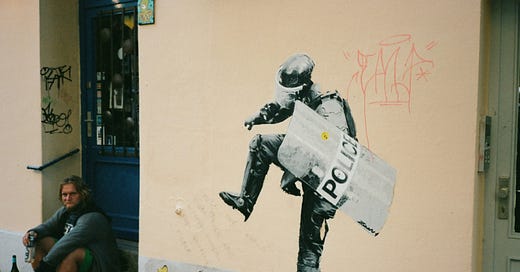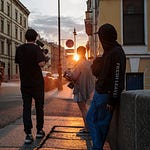Photo by Darya Sannikova on Pexels
Hey there everyone –
Last week I told you I was heading into a group training for the weekend. It was fantastic—very rigorous. I’m sitting with a lot, because it was long and demanding, and I haven’t had any time off yet to let anything really sink in. The group is rooted, in part, in Modern Analytic theory. One of the key aspects of this method is to translate feelings and thoughts into words, and to vocalize them in the group, in real time.
The leader encourages the group members to be curious about and receptive to any thought or feeling, regardless of how “wrong,” transgressive,” or “rebellious” it is. I found it really difficult to not only feel something, but identify it, figure it out enough to put it into words, and then get past my own prohibitions to actually say it out loud.
One of the principles of this method is to voice thoughts and feelings, rather than act on them, impulsively or unconsciously. It creates the possibility of a gap, an interruption, between a strong emotion and an action. So me being me, I immediately started to wonder how this practice might work to stop or prevent not only interpersonal but also structural violence.
When I verbalize and name my feeling, the feeing is immediately objectified: the feeling is part of “me,” in that I am representing myself to a group with words. But at the same time, the feeling is made strange—“not me”—when I put it into words and say it aloud. It is this thing, this idea of what a feeling is, not the feeling itself.
It’s also “just a feeling,”—that is, it is just a momentary state of being that is going to pass away, or return again. In naming my own feeling I am making the feeling more important, because I’m putting it out there, sharing it. At the same time I’m making it less important, because I’m releasing it in real time. I’m not holding on to it, burnishing it, justifying it, rationalizing it. I’m making it visible: here’s this idea, this feeling, this projection—I may be acting as if it is true, but it’s likely not “true” as in constant, accurate, lasting, permanent. If I can look at it, by myself and in a group of people, I can let it go, or alter it, or challenge it. Because it is both a part of me, and now apart from me, in the midst of the group process.
Ok! Thanks for hanging in with that abstract stuff. I’m getting back to the question part.
One thing Modern Analytic theory hasn’t talked a lot about is structural violence and oppression. The thoughts and feelings and projections that groups evoke and process are understood, largely, to be related to how we became a person in our families, in our lived experiences, and how we keep re-enacting those past experiences in the present moment.
There appears to be less practice in the field in helping people talk about the ways those experiences are also, at the same time, shot through with ideologies, with the impacts of structural and historical violence, with internalized oppression that stems from our being out of step with the dominant culture’s picture of what a “good” or “valuable” human being looks like, sounds like, what status they have, how much power they wield, etc.
As I write this, I want to acknowledge that I am brand new to this theory and still reading like mad, and so I apologize for what look like sweeping assertions, but are in actuality questions I am holding about analytic group process in the current moment.
I’ve been wondering: What would it be like to take this analytic group practice and use it to analyze feelings and thoughts in the context of structural violence and ideologies of domination like patriarchy and white supremacy?
I’ll give you an example of what I’m imagining as I ask this question. Picture a group of cops, sitting in a circle in an analytic process group. (Why does this sound like the beginning of a stand-up routine, and not a theoretical experiment?)
These cops have spent time attending lectures and participating in discussions about how ideology works, and the history of how white supremacy functions in the United States as a structure, not as a collection of actions by individuals. These discussions and lectures have created a context in which cops can examine police brutality not in terms of “bad cops” v. “good cops,” but rather by asking questions about how the police function, structurally, as an expression of white supremacy, regardless of what any individual cop thinks or feels.
In the process group, the cops have a chance to look at how they’ve both individually and collectively absorbed and re-enacted this ideology, and the ways in which policing is rooted in the history of enslavement in the United States.
Then the facilitator of the group—ideally also a cop—helps the cops begin to name the ways their feelings and projections onto “criminals” and “people who look suspicious” and “people who look upstanding” are rooted in this larger structure. The participants use the group to explore how their perceptions of others are influenced not just by their own personal histories, but also by these larger structures.
To be clear, I’m not talking about naming unconscious bias in the individual cop. I’m talking about using the group as a hive mind to explore ideologies, and a space of radical acceptance for all the feelings, all the projections of the group’s members. The purpose of the group is not so much to create insight into the emotional process of any individual member, but rather to employ the root concept in Modern Analytic theory– that to name and process feelings and projections in words can prevent unconscious or impulsive actions that harm.
The group would give the members the opportunity to name and process feelings about The Other, The Criminal, The Cop as archetypes, as categories of identity that are constructed by ideologies. The discussion would allow the group members to make these categories strange and alien and available for examination, rather than taken as true and accurate evaluations of people and cultures.
The question becomes: could the group’s collaboration in “making conscious” these categories of identity help them not only process the shame and rage and hatred and longing and terror that they feel every day on the job, but also could it help them become conscious of these feelings as they arise and shape their behavior on the street and in court? Could they get better and better at seeing these projections and feelings in real time? Could they, instead of blocking this awareness out of shame or self loathing, use it to help them slow down, help them stop their own and their collective brutality?
And if this model worked, could it be used in other contexts, like Fortune 500 companies, or Hollywood, to help executives recognize their internalized patriarchal views of women as objects onto which to project and enact sexual violence?
I realize this is kind of an intense post for Valentine’s Day. But in a perverse way, it’s kind of a love letter. For we can only access love and vulnerability when we drop our defenses. Ideologies of domination and oppression are about constructing the other as an object, as separate, or as a threat to our very survival. Ideologies of domination block communion, compassion, connection. Our terror blocks us from love. When we work to undermine and contest ideologies, we allow love to flourish.
Thanks, as always, for listening and reading.
Stay safe out there—
xo
Rebecca













Share this post